Related Research Articles

Lindsey Caroline Vonn is an American World Cup alpine ski racer. She won four World Cup overall championships – third amongst female skiers to Annemarie Moser-Pröll and Mikaela Shiffrin – with three consecutive titles in 2008, 2009, and 2010, plus another in 2012. Vonn won the gold medal in downhill at the 2010 Winter Olympics, the first one for an American woman. She also won a record eight World Cup season titles in the downhill discipline, five titles in super-G, and three consecutive titles in the combined (2010–2012). In 2016, she won her 20th World Cup crystal globe title, the overall record for men or women, surpassing Ingemar Stenmark of Sweden, who won 19 globes from 1975 to 1984. She has the third highest super ranking of all skiers, men or women.
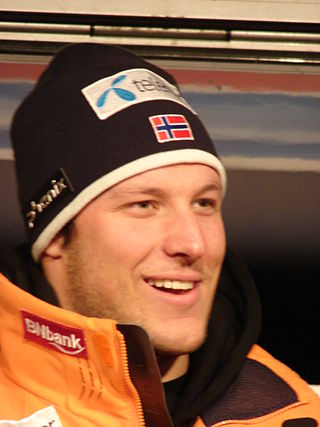
The 41st World Cup season was scheduled to begin on 28 October 2006, but cancellation of the opening races in Sölden delayed the season's start by two weeks. A very poor snowpack in the Alps, along with stormy weather in January, caused numerous races to be moved and rescheduled throughout the winter. The schedule included a mid-season break during the first 3 weeks of February for the World Championships in Åre, Sweden. The season concluded on 18 March 2007, at the World Cup Finals in Lenzerheide, Switzerland.

Dominique Gisin is a retired World Cup alpine ski racer and Olympic gold medalist from Switzerland. She is the older sister of alpine ski racers Marc and Michelle Gisin.
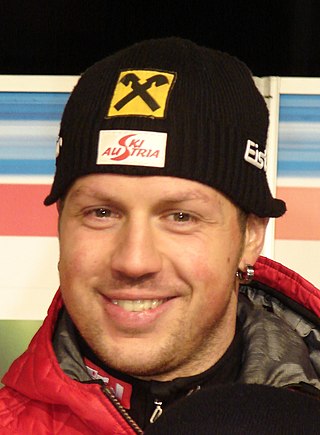
Mario Scheiber is an Austrian former skier who competed in all World Cup disciplines apart from slalom. He first started in a World Cup race on March 15, 2003, in Lillehammer. However, it was not until the 2004–05 season that he would start again in the World Cup, this time on a regular basis, finishing second twice and third once. In the 2005–06 season he participated in only one race because of a training injury. However, he had a successful comeback in the 2006–07 season, finishing in podium positions several times.

Lara Gut-Behrami is a Swiss World Cup alpine ski racer who competes in all disciplines and specializes in the speed events of downhill and Super-G. She won the gold medal in the super-G event at the 2022 Winter Olympics in Beijing. With 45 World Cup victories to her name across 3 disciplines, she is one of the all-time greats in Alpine skiing.
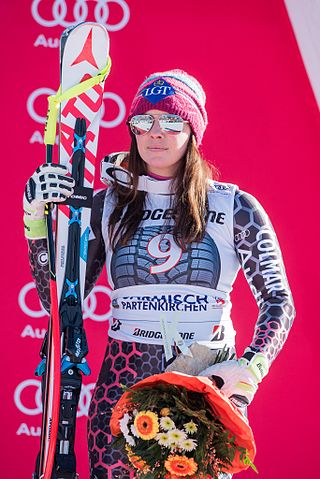
Christina Weirather is a retired Liechtensteiner World Cup alpine ski racer. She won a bronze medal in Super-G for Liechtenstein at the 2018 Winter Olympics in Pyeongchang.

Lotte Smiseth Sejersted is a former Norwegian alpine skier.

Larisa Yurkiw is a Canadian retired World Cup alpine ski racer, specializing in the speed events of downhill and super-G.

The 48th World Cup season began on 26 October 2013, in Sölden, Austria, and concluded on 16 March 2014 at the World Cup finals in Lenzerheide, Switzerland. The defending overall champions from the 2013 season were Marcel Hirscher of Austria and Tina Maze of Slovenia. The overall titles were won by Hirscher and Anna Fenninger, also of Austria. The season was interrupted by the 2014 Winter Olympics that took place from 7 to 23 February in Sochi, Russia, with the alpine events at Rosa Khutor.

Ragnhild Mowinckel is a retired Norwegian World Cup alpine ski racer, representing the club SK Rival.
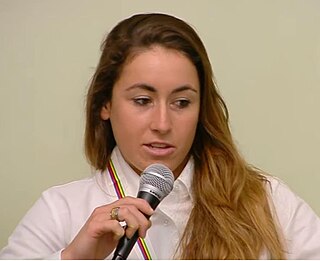
Sofia Goggia is an Italian World Cup alpine ski racer who competes in all disciplines and specialises in the speed events of downhill and super-G. She is a two-time Olympic downhill medalist — gold at the 2018 Winter Olympics, the first one for an Italian woman — and four-time World Cup downhill title winner.

Michelle Gisin is a Swiss World Cup alpine ski racer and competes in all disciplines. A two-time Olympic gold medalist, she won the Women's combined event in 2018 Winter Olympics, and Women's combined at the 2022 Winter Olympics. Born in Samedan, Graubünden, Gisin is the younger sister of alpine ski racers Marc and Dominique Gisin.
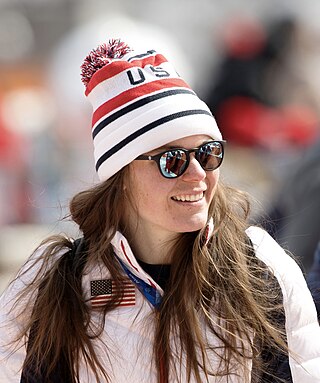
Breanna Noble "Breezy" Johnson is an American World Cup alpine ski racer on the U.S. Ski Team. She competes in the speed events of downhill and super-G.
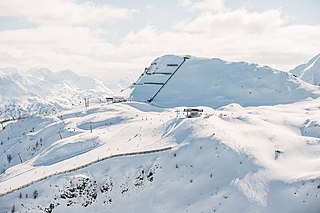
Zauchensee is a place in the Austrian municipality of Altenmarkt im Pongau, located in the state of Salzburg. Zauchensee is known for its ski resort and as a venue for the Alpine Ski World Cup.

Nina Ortlieb is an Austrian World Cup alpine ski racer, and specializes in the speed events of downhill and super-G. She is the daughter of Patrick Ortlieb, the Olympic gold medalist in downhill in 1992 and world champion in 1996.
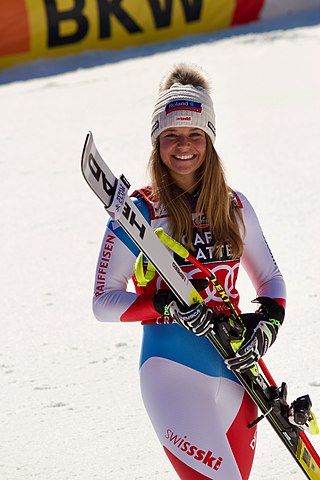
The women's downhill in the 2020 FIS Alpine Skiing World Cup involved 8 events, with only one canceled.

The women's downhill in the 2022 FIS Alpine Skiing World Cup consisted of nine events including the finals. Defending champion Sofia Goggia of Italy, who won four of the five downhills in which she competed in 2020–21, continued her domination in 2021–22 by again winning four of the first five downhills. Goggia took a commanding lead in the discipline after American Breezy Johnson, who finished second in each of the first three downhills, missed the rest of the season with a knee injury. Goggia then suffered her own knee injury, including a broken bone and ligament tears, while training for the last downhill prior to the 2022 Winter Olympics, but she was able to continue competing within a month and, after all but the final race of the season, had such a commanding lead that only one other competitor even had a theoretical possibility of overtaking her. At the finals, Suter failed to score, and Goggia won her second consecutive discipline championship.

The women's downhill competition in the 2016 FIS Alpine Skiing World Cup involved nine events, including the season finale in St. Moritz, Switzerland.
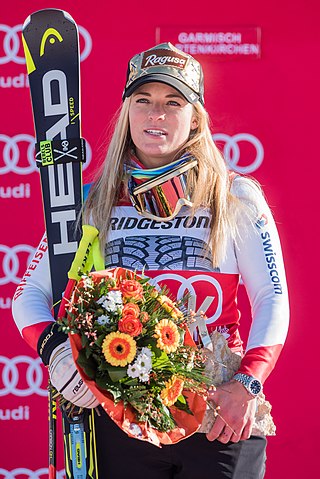
The women's super-G competition in the 2016 FIS Alpine Skiing World Cup involved sight events, including the season final in St. Moritz, Switzerland.

The women's super-G in the 2024 FIS Alpine Skiing World Cup consisted of nine events, including the final. One super-G on 10 December in St. Moritz was canceled, but it was rescheduled as a second super-G in Zauchensee on 12 January. As discussed in the season summary below, three more cancellations took place during February, reducing the season to eight races, but one downhill was then converted to a super-G to produce the final total of nine.
References
- ↑ "WOLF Tamara - Athlete Information". www.fis-ski.com. Retrieved September 16, 2020.
- ↑ Ambord, Beat. "Skionline Home". SKIONLINE: Das SKIPORTAL (in German). Retrieved September 16, 2020.
- ↑ "Selektionen Damen Ski alpin 2010/2011" (PDF) (in Swiss High German). December 3, 2013. Archived from the original (PDF) on December 3, 2013. Retrieved September 16, 2020.
- ↑ "SRF: Tamara Wolf wird Ski-Expertin". persoenlich.com. Retrieved September 16, 2020.
- ↑ Bärtsch, Benjamin Steffen und Philipp. "Karriere im Skisport: Tamara Wolf und Marc Berthod im Interview". NZZ am Sonntag (in German). Retrieved September 16, 2020.
- ↑ Germann, Mathias (December 21, 2019). "Premiere: Zwei Frauen kommentieren ein Skirennen beim SRF!". Blick. Retrieved September 16, 2020.
- ↑ Bühler, Stefan. "SRF-Moderator Sascha Ruefer flucht bei Ski-Übertragung". Nau (in German). Retrieved September 16, 2020.